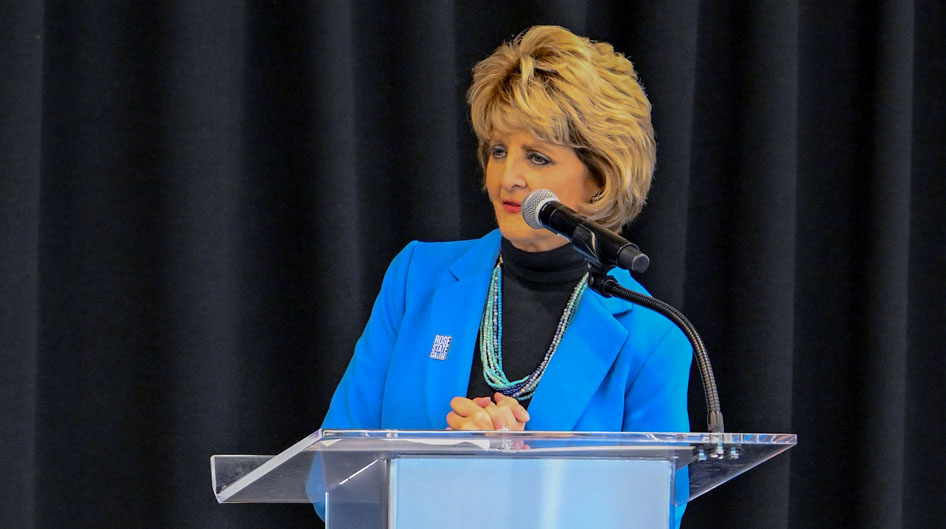Careers that Change the World: Emergency Management Published November 18, 2016
As our communities and country are shaped by large-scale disasters, people who can respond to these world-changing events are needed more than ever. Enter emergency managers. Professionals in this field play a vital role in changing the world through proactive problem solving and compassionate response in times of crisis.
“When tragedy strikes, our community’s readiness often relies on the emergency management personnel in the field,” says Dr. Jeanie Webb, president of Rose State College. Launching this fall, Rose State is proud to offer a new program to equip the next generation of emergency managers.

What do emergency managers do?
Crisis situations of many kinds affect our cities, regions, states and country each day, and coordination of response and relief efforts is a complex and critical job. Emergency managers work with law enforcement, medical response teams, fire departments and other public works to meet the needs of the community in these situations.
Emergency managers mitigate risks, create plans of action, and work behind the scenes to regain function in communities affected by natural disasters like floods or tornadoes, acts of terrorism or large-scale crime, or technological emergencies, such as explosions or hazardous spills.
Did you know? An emergency has more responders than victims. A disaster has more victims than responders.
The role of an emergency manager focuses on three things: preparation, response, and recovery. Preparation can involve drills, exercises and evacuations. Response involves coordination and communication, and recovery includes returning to a safe and fully operational state. Search-and-rescue efforts, re-opening schools and businesses, and repairing critical infrastructure all fall under emergency management.
“Most emergency managers are not on the scene. They’re in the operations center supporting the scene,” says Linda Pryor, Emergency Management academic advisor at Rose State.” It’s not just response but planning and delegating; you really have to learn to be a good manager.”
What is the job outlook for emergency management?
The Bureau of Labor Statistics indicates a growth rate of 6 percent through 2024 for emergency management as an industry, on par with average growth rates. However, a recent Wall Street Journal article suggests that emergency management may be expanding much more quickly – one of the top five expanding career fields in the country.
Cities are growing, businesses and technology are evolving, and weather is always volatile. Unfortunately, Oklahoma City is no stranger to disasters requiring the efforts of emergency managers across many jurisdictions.
Pryor also points out that private businesses are hiring emergency managers as well. “Large corporations like Walmart and oil companies have emergency managers working for them,” she says. “So do universities. It’s an up-and-coming field. It’s not just at your federal, state, county and city levels.”
Which qualities are essential for emergency managers?
In the past, a career as an emergency manager did not require a degree. However, as the industry becomes more relevant, current and aspiring EMs are looking to upgrade their skills and complete an accompanying degree to gain an edge in the field.
Pryor offers her insight on what makes a quality emergency manager: “They have to be a creative problem solver. An outside-of-the-box thinker. They have to be able to get other people to work together for a common goal – that’s their job. Emergency managers are constantly being proactive and creative and communicative. They have to be personable and have the persistence to deal with stressed people and limited resources. It’s very challenging field, but it’s also a fun and rewarding field.”
Rose State’s Emergency Management Program
Initiated by Albert Ashwood, director of emergency management for the state of Oklahoma, Rose State now offers a fully accredited associate of science degree program for Emergency Management, with an embedded 24-credit-hour professional certification in Emergency Preparedness and Planning.
“Rose State’s program is based on real-world experience and understandings and that is a differentiator for attracting students from around the region for this growing profession,” Rose State President Dr. Webb says.
Under the Federal Emergency Management Agency (FEMA), each state has its own emergency management department to coordinate among government, private, military and voluntary organizations during crises. Ashwood and the Oklahoma Department of Emergency Management recognized a need for a reality-based program to prepare the next generation of managers for our state.
Jackie Wright developed the curriculum for Rose State and will be leading the instruction. Wright has served as the state training officer for OKDEM since 2004 after beginning his career in military emergency management. Linda Pryor, who served as Oklahoma’s statewide exercise coordinator and has experience in county-level emergency management, will be available to advise students as they complete the program and enter the job market.
What makes Rose State’s Emergency Management program unique?
Pryor points out that perhaps the most valuable part of Rose State’s program is the capstone course, where students have the opportunity to intern for emergency managers in counties and cities throughout Oklahoma. This program is like nothing else in the Oklahoma City area.
- The Rose State program is 1 of only 12 programs of its kind in the country.
- The curriculum goes beyond theory to practice real-life scenarios.
- Grants are available from OKDEM to cover half the cost of tuition and books.
- Qualified Oklahoma emergency managers can earn an average salary of $45,000 to $50,000.
If you desire to make a difference in your community, whether here at home or across the nation, emergency management is a growing field with many exciting opportunities. Contact Linda Pryor at 405-765-9232 or lpryor@rose.edu for more information or to begin an application today.



